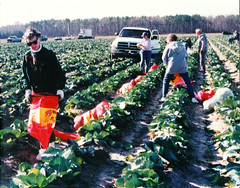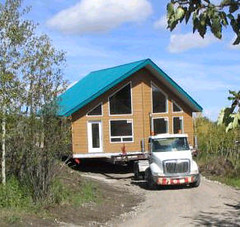Part 2: Items 6-10
This is the second installment of the 20 ways to live on little-to-nothing. Obviously, not all of these alternatives will appeal to everyone. But perhaps some will appeal to some.
6. Personal Housing for the Gypsy Tread-Lightly

If your lifestyle doesn’t require thousands of square footage consider the advantages of an RV or travel trailer. No, not one of those $200,000 new fancy jobs, but one just “big enough” and in desperate need of some handy TLC.
Getting “free” will take more ingenuity that most people have to spend, but getting “cheap” is entirely possible. Unless you’re a serious mechanic, travel trailers are a much better option than RVs or old city buses that probably need totally rebuilt engines. A trailer can be moved as regularly as necessary (many state and national forest sites have 2-week limits) so long as you’ve something to haul them with.
7. Take Advantage of Gypsy Food Sources

If you move around quite a bit, you’ll have more opportunities than most people to take advantage of wild foods along the back roads and byways of your travels. Did you know that your basic cattails are a regular supermarket of goodness? Or that acorn flour makes great bread or breakfast mush that’s extremely healthy? Did you know that violets, tiger lilies and nasturtium flowers make a very tasty salad?
There are apple and pear trees that have escaped old homesteads, often right beside the road. In some producing regions you can glean fruit from orchards after main harvest. Grapefruit, oranges, peaches, apples, sometimes cherries and grapes as well. Truck and grain crops can sometimes be gleaned as well, allowing you to pick vegetables that weren’t ripe for the main harvest and will otherwise be left to rot.
8. A Place Of Your Own

Free land? In the 21st century? Believe it or not, there are towns in the Midwest offering land for free to people willing to build new homes within 2 years. Of course, this means you’ve got to invest in building a new house, and that’s certainly not zero cost! Do not be fooled - the US Government [BLM] stopped offering free land in 1976. You can’t just go claim some.
Yet an industrious and/or well-connected professional caretaker could end up with space enough to put a home in exchange for simply living there to take care of things! That way you don’t have to “stuff-less” or rootless, your home is your own. This takes some diplomatic skills and might take years to work yourself into, but there are people who got their property (including yard and garden!) for free on a corner of someone else’s property.
9. No-Cost Housing for the Handy

People might be surprised at what’s available out there for those willing to do the work or bargain with others for the services. Older houses on acreage that’s being subdivided for development are often given away rather than simply torn down, but you’ll have to move it to where you want it. Those who can build and re-build can often tear them down and keep everything for rebuilding on their own property. Which is often much cheaper than moving a farmhouse…
Careful inspection to decide the best relocation option is required. If that house will fall apart two blocks down the road, you’ll be better off just taking it down and hauling it off in pieces. Building materials, bathroom fixtures, plumbing, wiring and electrical box equipment, kitchen cabinets, cabinets and even sinks are often available for free where a developer is tearing down older dwellings to make way for new too.
10. Powering Your Living Space

Cost of electricity is always going to be with us, it seems. Still, there are alternatives out there that a handy person could make good use of. There are ways to obtain free solar panels that would make a real dent in a traveling home or even a stationary one. If you’ve some land of your own or you end up in a community of like-minded people, think about developing a diversified alternative system.


No comments:
Post a Comment